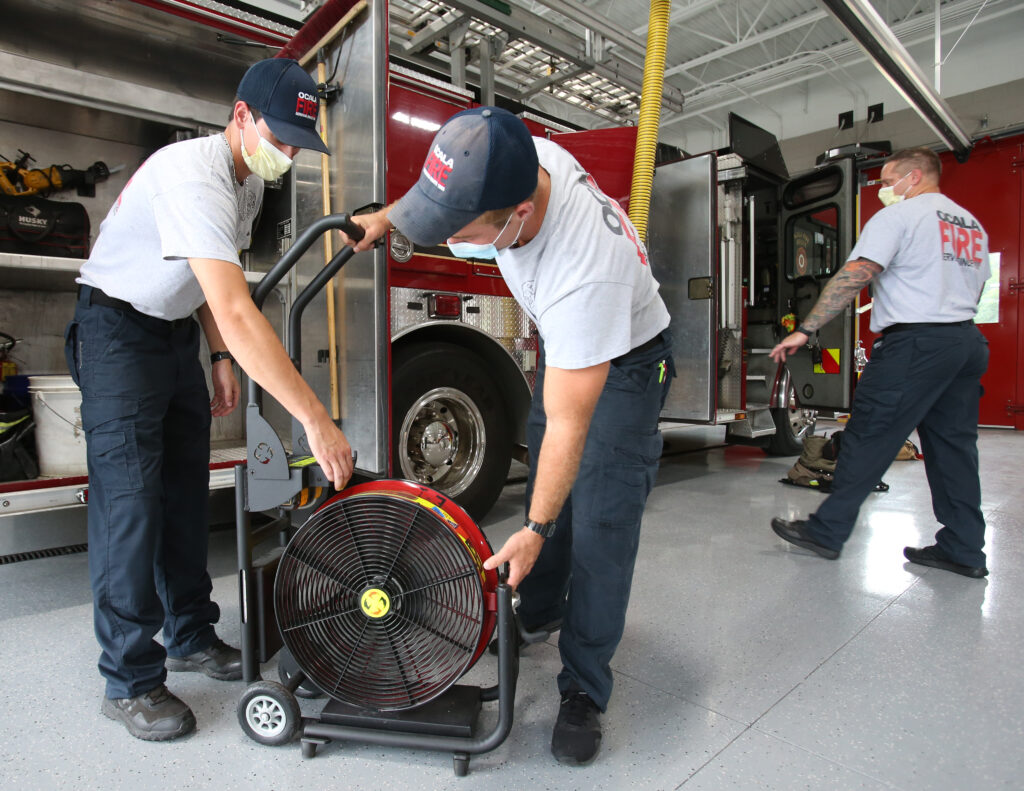Ocala fire fee refunds coming, but will take a while

Ocala Rescue firefighters Micah Day, left, Ross Gauthier and Mike Bullard check the equipment on an engine at Ocala Fire Rescue Station 1 on Northeast 8th Avenue in this July file photo. The city is facing paying a multi-million dollar judgement for the way it collected fire service fees. [Bruce Ackerman/Ocala Gazette]

Ocala Rescue firefighters Micah Day, left, Ross Gauthier and Mike Bullard check the equipment on an engine at Ocala Fire Rescue Station 1 on Northeast 8th Avenue in this July file photo. The city is facing paying a multi-million dollar judgement for the way it collected fire service fees. [Bruce Ackerman/Ocala Gazette]
The latter issues remain unresolved and could take months to sort out.
One thing clarified at a Friday hearing on the matter before 5th Judicial Circuit Court Judge Robert Hodges, however, is that the city is not considering bankruptcy.
Instead, the city plans to use reserves combined with a loan to refund upwards of $79.4 million collected in monthly fees to pay for fire service. In a previous filing, the city brought up the specter of bankruptcy after the fee was ruled an unconstitutional tax in June.
Friday’s hearing centered on how the court would determine the number of people who qualified for a refund and establish how much to set aside to pay them.
The city argued only those people who paid the fee before March 2018 and after February 2010 qualified. The plaintiffs’ attorney argued those who paid through July 2020 – when the city finally suspended the fee – should also qualify.
“Because there is an end date here… It would end for anyone who paid the tax until it ended on July 21, 2020,” Hodges said.
It will take weeks to contact potentially thousands of people who paid the fee as part of their Ocala Electric Utility bill from March 2018 to July 2020. As it stands, there are almost 76,000 people who could qualify for a refund. Those people can opt-out of joining the class-action lawsuit, however.
As for how much the city owes. That remains unknown until after a full accounting of those who seek a refund.
But Patrick Gilligan, the city’s attorney, said they plan to ask for a jury trial to determine the amount the city owes.
If that request is granted, it could take even longer to resolve the issue. Thanks to the COVID-19 pandemic, all trials, criminal and civil, have been on hold since March.
“We believe we do have a right to a jury trial on damages. The laws of the State of Florida require we have a trial on damages,” Gilligan said, referring to the city arguing for a set-off of damages.
It was one of several defenses the city made in the nearly seven-year-long case. The argument is that the city provided the fire services and should get some “set off” or credit toward the final damages. Neither the lower court nor the appeals court directly addressed that issue, Gilligan argued.
Derek Schroth, an attorney for the plaintiffs, argued the Florida 5th District Court of Appeal already spoke on that issue by ordering a refund.
“The set-off issue was before the appellate court, and they still ruled for a common fund to refund all the illegally-collected taxes,” Schroth said. “If there is a defense of set-off, you would never have a refund of an illegal tax because the government would always say, ‘We provided services.’”
Hodges said that argument was for another day.
“If it’s a legal question, it will be resolved by the court. If it’s a fact question that’s unresolved, it would go to a jury,” Hodges said.
Hodges also said he would work with the city to avoid putting them in a positing of financial ruin.
“I’m mindful of the fact that many of the same people who will be getting a refund will be paying for the refund. It’s not like the city took this money and put it in their pocket. It was used for a legitimate city service,” he said.
The case began in 2014 when Discount Sleep of Ocala LLC and Dale W. Birch filed a lawsuit challenging the fee.
Circuit Judge Lisa Herndon dismissed that suit after ruling the statute of limitations expired. Ocala originally enacted the fee in 2006, and the statute of limitations to challenge is four years.
But the appeals court reversed the decision to dismiss because the city repealed the original fee in 2009 and then brought it back in 2010. The appeals court found the 2014 suit fell within four years of the fee’s reinstatement.
On its second trip through circuit court, Herndon ruled the case could not continue as a class action and was again dismissed. The appellate court reversed again, sending the case back for a second time.
In 2019, Herndon ruled the user fee was lawful. But in June, the appeals court reversed for the third time and ordered the court to establish a fund to pay refunds.
In the past, Schroth argued the entire process was avoidable had the city passed a traditional tax in the first place.
On Tuesday, the Ocala City Council approved a non-ad valorem tax to pay for fire service.






